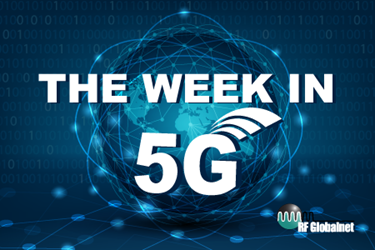The Week in 5G: 1/14/2020 — U.S. Accelerates Efforts to Boost Domestic 5G Development, Stifle China's Gains
By Ed Biller

In CES 2020 tech news, Razer introduced at the show a 5G version of its Sila gaming router. According to a report by The Verge, “unlike many other home routers, the Sila 5G also features a rechargeable battery, allowing it to double as a mobile hotspot — albeit a mobile hotspot that features four Ethernet ports and can theoretically run a small LAN tournament wherever you go.”
CNET reports that, while not numerous, the 5G handsets at CES hinted at trends we’ll see in 2020, “including cheaper applications of 2019's most expensive features.” Among these trends, CNET lists more affordable foldable phones, innovation in mobile phone cameras and so-called “gaming phones,” and a general decrease in the cost of 5G-capable handsets.
In 5G network news, China Mobile reports that it begins 2020 with 3.8 million 5G users and aims to sign up 100 million 5G users by the end of the year. Light Reading reports that, last year, China Mobile invested about $3.5 billion “in 5G networks and deployed 50,000 base stations in 50 cities.”
In the United States, a former (U.S.) House Intelligence Committee chairman will serve as chairman of 5G Action Now, “a new advocacy organization established to fight for the rapid deployment of 5G technology in the United States and raise the alarm about the importance of winning the 5G race against China,” according to an announcement by the organization.
Related, U.S. Sen. Tom Cotton (R-Ark.) recently introduced a bill “that would prohibit the United States from sharing intelligence with countries that allow Huawei to operate their 5G networks.”
Indeed, a delegation of US officials is headed to the United Kingdom in an attempt to persuade Britain against implementing Chinese tech giant Huawei’s equipment in the country's 5G network.
“The UK is expected to make its final decision on how to deploy Huawei's equipment in its future 5G networks later this month,” reports TechRadar.
Nonetheless, during a BBC interview on Tuesday, British Prime Minister Boris Johnson pushed back against the U.S. and other individuals or nations speaking out against Chinese manufacturers, stating naysayers should offer suggestions alongside their criticisms.
“The British public deserve to have access to the best possible technology,” Johnson said. “Now, if people oppose one brand or another, then they have to tell us what’s the alternative, right?”
Also in the U.S., Samsung Electronics announced a deal to acquire Chantilly, VA-based TeleWorld Solutions (TWS). “TWS provides network design, testing and optimization services to mobile service and cable operators, equipment OEMs and other companies,” states a Samsung release, noting that “the acquisition will address the need for end-to-end support in delivering network solutions.”
Finally, Broadcasting + Cable reports that the U.S. Federal Communication Commission’s high-band frequency spectrum auction (auction 103) has drawn over $7 billion dollars in gross bids following 45 rounds of bidding over nine days.
“The 35 qualified bidders in the auction are competing for a whopping 3,400 MHz of millimeter-wave spectrum (in the upper 37 GHz, 39 GHz, and 47 GHz bands), the most spectrum the FCC has ever offered in an auction of any type. The spectrum can be used for both fixed and mobile broadband and is being auctioned in 100 MHz blocks in partial economic areas (PEAs),” reports B+C.
